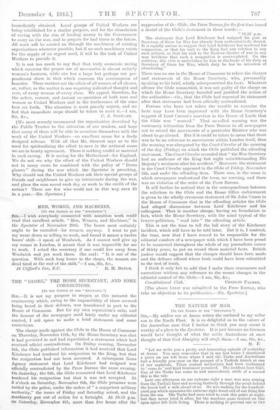THE " GLOBE," THE HOME SECRETARY, AND SOME CORRECTIONS.
[TO TOE EDITOR OF THE " SPECTATOR."] Sxn,—It is not my purpose to reopen at this moment the controversy which, owing to the impossibility of those accused being heard in their defence, was transferred in part to the House of Commons. But for my own reputation's sake, and the honour of the newspaper until lately under my editorial .control, I ask space to make a brief statement and some corrections.
The charge made against the Globe in the House of Commons on Thursday, November 11th, by the Home Secretary was that it had persisted in and had republished a statement which had received official contradiction. On Friday evening, November 15th, the Globe published information it had received that Lord Kitchener had tendered his resignation to the King, but that the resignation had not been accepted. A subsequent News Agency statement that Lord Kitchener had resigned was officially.contradicted by the Press Bureau the same evening. On .Saturday, the 6th, the Globe reasserted that. Lord Kitchener tendered his resignation but that it was not accepted. At o'olook on Saturday, November 6th, the Globe premises were raided by the police, under the orders of " a competent military authority," the issues of Friday and Saturday seized, and the maohinery put out of action for a fortnight. ,At 10,35 p.m. on Saturday, November 6th, more than five hours after the
suppression of th3 Globe, the Press Bureau for the first time issued a denial of the Globe's statement in these words :-
" 10.35 p.m. The statement that Lord Kitchener had resigned his post as Secretary of State for War has already been authoritatively denied. It is equally untrue to suggest that Lord Kitchener has tendered his resignation, or that his visit to the King had any relation to any such subject, or that his visit to the Eastern theatre of war in any way betokens that such a resignation is contemplated. On the contrary, this visit is undertaken by him in discharge of his duty as Secretary of State for War, which duty he has no intention of abandoning."
There was no one in the House of Commons to refute the charges and statements of the Home Secretary, who, presumably speaking to his brief, wholly misrepresented the facts. Whatever offence the Globe committed, it was not guilty of the charge on which the Home Secretary founded and justified the action of the authorities—viz., that the Globe had repeated its statement after that statement had been officially contradicted.
Persons who have not taken the trouble to examine the facts may have been impressed with the Home Secretary's support of Lord Curzon's assertion in the House of Lords that the Globe was " warned." That so-called warning was the customary intimation from the Press Bureau to all newspapers not to record the movements of a particular Minister who was about to go abroad. But if it could be taken to mean that there was to be no reference to movements within London itself, then the warning was abrogated by the Court Circular. of the morning
of the day (Friday) on which the Globe published the offending statement. The Court Circular recorded that " the War Secretary had an audience of the King last night notwithstanding His Majesty's weakness after his accident." Moreover, the statement in the Court Circular appeared in the Globe of Friday, November 5th, and under the offending item. There was, in the sense in which newspapers understand the term, no warning, and there was no violation of the order of the Press Bureau.
It will further be noticed that in the correspondence between the solicitors to the Globe and the Home Office endorsement is given to the wholly erroneous statement of Sir John Simon in the House of Commons that in the offending articles the Globe had alleged dissensions between Lord Kitchener and his colleagues. That is another charge, having no foundation in fact, which the Home Secretary, with the mind typical of the lawyer-politician, " read into " the offending article.
This is not the time to tell the full story of tho Kitchener incident, which will have to be told later. But it is, I contend, the time, now that have ceased to be responsible for the editorial conduct of a newspaper with which I have been proud to be connected throughout the whole of my journalistic career of thirty years, to put on record these material facts. British justice would suggest that the charges should have been made and the defence offered where both could have been submitted to the test of truth.
I think it only fair to add that I make those statements and corrections without any reference to the recent changes in the
editorial control of the Globe.—I am, Sir, &o., Constitutional Club.' CHARLES PALMER. [The above letter was submitted to the Press Bureau, who take no objection to its publication.—En. Spectator.]




















































 Previous page
Previous page